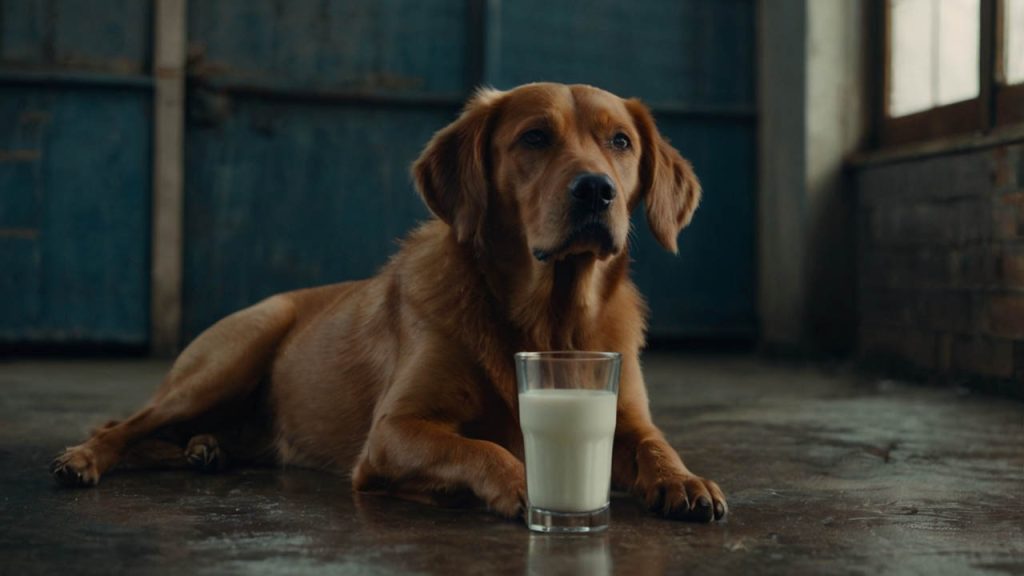The Ultimate Guide: Can Dogs Have Warm Milk?
The story is a classic, comforting image from our own childhoods: a warm cup of milk before bed to help us sleep. It’s a picture of comfort and nourishment. So, when our beloved canine companion is feeling a bit under the weather or we just want to offer them a special, soothing treat, it’s natural to wonder, “Can dogs have warm milk?” While the intention behind this question comes from a place of love, the answer is a story that is far more complex than a simple “yes” or “no.” The reality is that for most adult dogs, cow’s milk is not a good or healthy choice, regardless of its temperature.
This comprehensive guide will tell the complete story of milk and your dog’s digestive system. We will begin by exploring the primary reason why milk is a problem for most canines: lactose intolerance. Subsequently, we will discuss the other potential health concerns associated with this dairy product. Furthermore, we will address the specific question of whether warming the milk makes any difference. Consequently, you will be empowered with the scientific knowledge to understand why this seemingly harmless treat is best avoided and what safer alternatives you can offer instead.
Why You Must Ask, “Can Dogs Have Warm Milk?”
Before we dive into the details, it’s vital to understand the fundamental biological reason why this question is so important. When puppies are born, their bodies produce a large amount of an enzyme called lactase. The job of lactase is to break down lactose, the primary sugar found in their mother’s milk. This is how they get their nutrition.
However, as a puppy is weaned off of their mother’s milk and starts eating solid food, their body’s production of lactase naturally and dramatically decreases. This means that most adult dogs are, to some degree, lactose intolerant. They simply do not have the necessary enzymatic machinery to properly digest the lactose in cow’s milk. This is the central plot point in the story of can dogs have warm milk.

The Primary Risk: The Story of Lactose Intolerance
When a lactose intolerant dog drinks cow’s milk, the undigested lactose travels through their gastrointestinal tract, wreaking havoc along the way.
- The Effect: In the gut, the undigested sugar draws water into the intestines and ferments, leading to a host of uncomfortable and messy symptoms.
- The Symptoms:
- Diarrhea
- Gas and bloating
- Stomach cramps and abdominal pain
- Vomiting
The severity of these symptoms can vary depending on the individual dog’s level of intolerance and the amount of milk they consume. A small sip might cause no issues, while a full bowl could lead to a very unpleasant afternoon for both you and your dog.
Other Health Concerns: Why Milk Isn’t a Healthy Choice
Beyond the issue of lactose, there are other reasons why cow’s milk is not an ideal treat.
The Problem with High Fat Content
Milk, especially whole milk, is high in fat.
- The Risk: A sudden introduction of a high-fat food can be too rich for a dog’s digestive system, potentially leading to an upset stomach. In some dogs, especially certain breeds prone to it, a high-fat meal can even be a trigger for pancreatitis, a painful and serious inflammation of the pancreas.
The Issue of Unnecessary Calories
Milk contains calories and sugars that your dog does not need.
- The Risk: Regularly giving your dog milk can contribute to unhealthy weight gain and obesity, which is a major health concern that can lead to a host of other problems, like joint issues and diabetes. This is a critical consideration when asking if dogs can have warm milk.

Does Warming the Milk Make a Difference?
So, back to our original question: Can dogs have warm milk? Does the temperature change the story?
- The Answer: No. Warming the milk does not change its chemical composition. It will still contain the same amount of lactose and fat. Therefore, it does not make it any easier for a lactose-intolerant dog to digest. The risks remain exactly the same.
What About Milk Alternatives? A Safer Story?
- Goat’s Milk: Some proponents claim that goat’s milk is easier to digest because it has slightly less lactose and smaller fat globules. While some dogs may tolerate it better, it still contains lactose and should be given with caution.
- Plant-Based Milks (Oat, Almond): These are lactose-free, but they come with their own set of potential issues, such as high sugar content and a risk of toxic additives like xylitol.
The American Kennel Club (AKC) provides a great, vet-reviewed overview of why milk is generally not a good idea for dogs.
The Final Verdict: The Best and Safest Choice for Your Dog
So, can dogs have warm milk? The story’s conclusion is that it is best to avoid it. While a tiny lap from the bottom of your cereal bowl is unlikely to cause a major issue for most dogs, it offers no real nutritional benefits and comes with a significant risk of causing an upset stomach and other health problems.
The absolute best, safest, and healthiest drink you can offer your dog is, and will always be, fresh, clean water.
If you are looking for a special, comforting, and safe treat, consider these alternatives:
- A small amount of low-sodium, unseasoned bone broth (served warm, not hot).
- A spoonful of plain, unsweetened, xylitol-free pumpkin puree.
A Story of Responsible Care
The story of being a great dog owner is a story of making informed and safe choices. While the image of a dog enjoying a saucer of milk is a nostalgic one, the reality is that it’s a treat that is not well-suited to their biology. By understanding the science behind lactose intolerance and choosing safer, more appropriate treats, you are showing your love in the most responsible way possible.
Have you ever given your dog milk? What was their reaction? Share your experiences in the comments below! For a complete guide on what your dog can and can’t eat, be sure to read our article on [The Ultimate List of Human Foods Your Dog Can and Can’t Eat].


